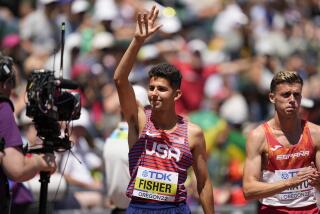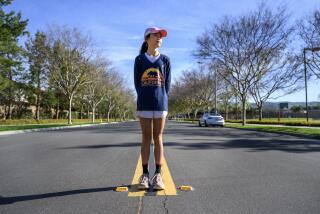ANALYSIS : Runners’ Historic Week Has Downside
- Share via
Distance running long has had a god in Finland’s Paavo Nurmi, who set 35 world records in the 1920s and ‘30s. Now it might have its goddess in China’s Wang Junxia.
When she won the 3,000 meters Monday in 8 minutes 6.11 seconds during China’s National Games at Beijing, it was the fourth time in six days over three distances that she has run faster than the previous world record.
Track and field historians were poring over their record books to see whether any athlete has ever had a better meet--other than Jesse Owens, who broke three world records and tied another in four events in one day of the 1935 Big Ten championship meet.
“This is stunning, to say the least,” said Tom Sturak, a shoe company representative. “I thought Henry (Rono) was the most gifted runner of all. This woman is in that class.”
Rono, of Kenya, broke world records in four events from 2,000 to 10,000 meters in 81 days in 1978.
Last Wednesday, Wang won the 10,000 meters in 29:31.78, breaking the world record by almost 42 seconds. Three days later, on Saturday, she finished second in the 1,500, but her time of 3:51.92 was faster than the previous world record of 3:52.47 set in 1980 by the Soviet Union’s Tatiana Kazankina.
The next day, in a 3,000 semifinal heat, Wang ran 8:12.19, more than 10 seconds faster than Kazankina’s 1984 world record of 8:22.62. In Monday’s final, Wang lowered the record by another six seconds.
Another runner, Qu Yunxia, also had an exceptional meet. She won the 1,500 meters Saturday in a world-record time of 3:50.46, becoming one of five women to better Kazankina’s best in Sunday’s 3,000 semifinals, then finished second in Monday’s final in 8:12.18.
Because Wang and Qu, both 20, never indicated before this meet that they were ready to run the times they did, speculation among athletes, coaches and officials has been that the Chinese are using drugs.
But even if that is not true, the sport has suffered because attention again has shifted from performances to illegal performance-enhancers, which cast a shadow over the sport after sprinter Ben Johnson tested positive during the 1988 Summer Olympics for using anabolic steroids.
“There’s a lot of gloom in the halls here,” said Pete Cava, a spokesman for USA Track & Field at Indianapolis. “It feels like we’ve been dropped back to October, 1988. Up until now, the focus has been on the performances in the World Championships last month. Now, we have all this discussion about drugs again.”
Record Streaks
Following are middle-distance and distance runners who have, over a period of weeks, days or even minutes, accomplished some of the outstanding performances in track history:
* PAAVO NURMI, Finland--On June 19, 1924, at Helsinki, Finland, the Flying Finn ran the 1,500 meters in a world-record time of 3:52.6. Fifty minutes later, he returned to break the world record in the 5,000 in 14:28.2.
* GUNDER HAAGG, Sweden--Between July 1 and Sept. 20 in 1942, Haagg broke world records in seven distances--1,500, mile, 2,000, two miles, 3,000, three miles and 5,000.
* EMIL ZATOPEK, Czechoslovakia--In the 1952 Summer Olympics at Helsinki, Zatopek won the 10,000 on July 20, the 5,000 on July 24 and the marathon on July 27.
* LASSE VIREN, Finland--He became only the fourth man to win both the 5,000 and the 10,000 in the Summer Olympics when he did it at Munich in 1972, then became the only one to repeat in both events four years later at Montreal. He also ran the marathon in 1976, although it was scheduled 24 hours after the 5,000. He finished fifth.
* HENRY RONO, Kenya--Within 81 days in 1978, Rono broke world records in four events--2,000, steeplechase, 5,000 and 10,000.
* WANG JUNXIA, China--She ran faster than the previous world record four times over six days in three events--1,500, 3,000, 10,000--during China’s 1993 National Games. Her time of 29:31.78 in the 10,000 broke the record by almost 42 seconds as she became the first woman to run under 30 minutes in the event. Her 3,000 time Monday of 8:06.11 is more than 16 seconds faster than the record that stood for nine years before she first broke it in a semifinal heat Sunday.
More to Read
Go beyond the scoreboard
Get the latest on L.A.'s teams in the daily Sports Report newsletter.
You may occasionally receive promotional content from the Los Angeles Times.










